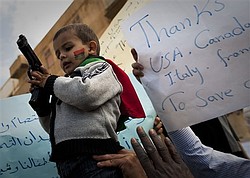Gadhafi forces roll back from two key cities
ASSOCIATED PRESS
A gun was handed over to a Libyan boy during a rally in support of the allied air campaigns against the troops of Moammar Gadhafi in Benghazi, eastern Libya, Wednesday, March 23, 2011.
Associated Press
BENGHAZI, Libya
NATO ships began patrolling off Libya’s coast Wednesday as airstrikes, missiles and energized rebels forced Moammar Gadhafi’s tanks to roll back from two key western cities, including one that was the hometown of army officers who tried to overthrow him in 1993.
Libya’s opposition took haphazard steps to form a government in the east, as they and the U.S.-led force protecting them girded for prolonged and costly fighting. Despite disorganization among the rebels — and confusion over who would ultimately run the international operation — coalition airstrikes and missiles seemed to thwart Gadhafi’s efforts to rout his opponents, at least for now.
Coalition aircraft hit a fuel depot in Tripoli, a senior government official told reporters in a late-night news conference. Deputy Foreign Minister Khaled Kaim at first denied reports that Gadhafi’s compound in Tripoli was hit earlier, then bactracked and said he had no information about that. Other targets Wednesday were near Benghazi and Misrata, he said.
U.S. Defense Secretary Robert Gates acknowledged there is no clear end to the international military enforcement of the no-fly zone over Libya, but President Barack Obama said it “absolutely” will not lead to a U.S. land invasion.
From Ajdabiya in the east to Misrata in the west, the coalition’s targets included Libyan troops’ mechanized forces, mobile surface-to-air missile sites and lines of communications that supply “their beans and their bullets,” said Rear Adm. Gerard Hueber, a top U.S. officer in the campaign in Libya.
He asserted that Gadhafi’s air force has essentially been defeated. He said no Libyan aircraft had attempted to fly over the previous 24 hours.
“Those aircraft have either been destroyed or rendered inoperable,” Hueber told Pentagon reporters by phone from the U.S. command ship in the Mediterranean Sea.
A doctor in Misrata said Gadhafi’s tanks fled after the airstrikes, giving a much-needed reprieve to the besieged coastal city, which is inaccessible to human-rights monitors or journalists. The airstrikes struck the aviation academy and a vacant lot outside the central hospital, the doctor said.
Neither the rebels nor Gadhafi has mustered the force for an outright victory, raising concerns of a prolonged conflict.
Gates said no one was ever under any illusion that the assault would last just two or three weeks. He had no answer when asked about a possible stalemate if Gadhafi hunkers down, and the coalition lacks U.N. authorization to target him.
Obama, when asked about an exit strategy during an interview with the Spanish-language network Univision, didn’t lay out a vision for ending the international action but rather said: “The exit strategy will be executed this week in the sense that we will be pulling back from our much more active efforts to shape the environment.”
The administration wants others to lead the way soon: Gates said the U.S. could relinquish control as soon as Saturday. Members of the coalition, however, were divided over the details.
In a compromise proposal, NATO would be guided by a political committee of foreign ministers from the West and the Arab world. But NATO nations remained deadlocked over the alliance’s possible role in enforcing the U.N.- authorized no-fly zone.
NATO warships, meanwhile, started patrolling Wednesday to enforce the U.N. arms embargo against Libya.
Secretary of State Hillary Rodham Clinton said Gadhafi can end the crisis quickly — by leaving power.
 43
43

